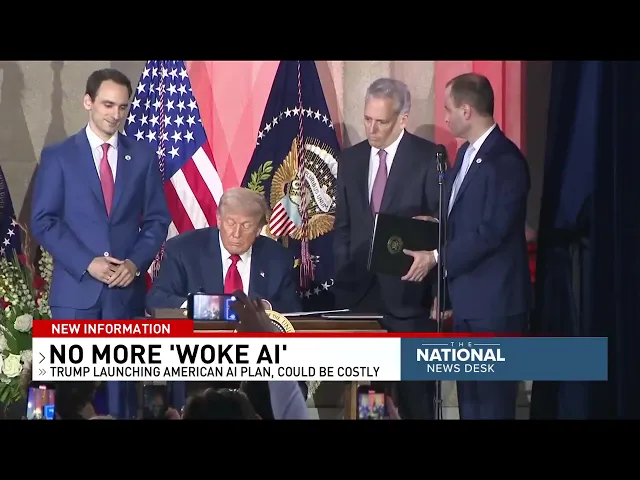No ‘woke AI’ models in Washington: Trump’s new action plan could carry hefty price tag

Trump versus 'woke AI' regulation ahead
When newly re-elected President Trump unveiled his AI policy vision during the campaign, the tech world took notice. His sweeping promises to roll back Biden-era AI regulations and Executive Order 14110, while simultaneously establishing new governance mechanisms like the AI Safety Institute, sent mixed signals about exactly how a second Trump administration would approach artificial intelligence oversight. After much anticipation, Trump's post-election AI action plan is starting to take shape—with potentially significant ramifications for both tech companies and government agencies.
Trump's transition team is advancing what appears to be a stark departure from existing AI governance approaches, with spokesperson Karoline Leavitt declaring there will be "no more woke AI models being purchased by Washington." While the statement's combative rhetoric sounds familiar, policy experts are now analyzing what this might actually mean in practice for federal AI procurement and regulation. As tech companies navigate this uncertain landscape, understanding the practical implications of these shifts is becoming increasingly important.
Key aspects of Trump's emerging AI stance:
-
Procurement overhaul: The incoming administration plans to dramatically reshape how government agencies purchase and deploy AI systems, potentially eliminating models deemed politically biased while establishing new certification requirements.
-
Regulatory rollback: Trump's team has signaled intentions to dismantle significant portions of Biden's Executive Order 14110, which established comprehensive AI risk management frameworks, testing standards, and safety protocols that many tech companies have already invested in implementing.
-
Alternative governance mechanisms: Despite the deregulatory focus, Trump has proposed creating new oversight bodies like the Department of Government Efficiency (DOGE) and an AI Safety Institute that would establish different evaluation criteria for AI systems.
-
Potential economic impact: The transition between regulatory frameworks could impose substantial costs on both federal agencies and AI vendors, as existing compliance investments might need to be redirected toward new standards.
The real impact of "anti-woke" AI procurement
The most consequential element of Trump's emerging AI strategy may be how it reshapes the $750 billion federal procurement system. The administration's focus on eliminating "woke AI" from government purchasing decisions represents more than just cultural signaling—it could fundamentally alter how AI systems are evaluated, certified, and deployed across federal agencies. The practical challenge lies in defining what constitutes "woke" in algorithmic systems
Recent Videos
How To Earn MONEY With Images (No Bullsh*t)
Smart earnings from your image collection In today's digital economy, passive income streams have become increasingly accessible to creators with various skill sets. A recent YouTube video cuts through the hype to explore legitimate ways photographers, designers, and even casual smartphone users can monetize their image collections. The strategies outlined don't rely on unrealistic promises or complicated schemes—instead, they focus on established marketplaces with proven revenue potential for image creators. Key Points Stock photography platforms like Shutterstock, Adobe Stock, and Getty Images remain viable income sources when you understand their specific requirements and optimize your submissions accordingly. Specialized marketplaces focusing...
Oct 3, 2025New SHAPE SHIFTING AI Robot Is Freaking People Out
Liquid robots will change everything In the quiet labs of Carnegie Mellon University, scientists have created something that feels plucked from science fiction—a magnetic slime robot that can transform between liquid and solid states, slipping through tight spaces before reassembling on the other side. This technology, showcased in a recent YouTube video, represents a significant leap beyond traditional robotics into a realm where machines mimic not just animal movements, but their fundamental physical properties. While the internet might be buzzing with dystopian concerns about "shape-shifting terminators," the reality offers far more promising applications that could revolutionize medicine, rescue operations, and...
Oct 3, 2025How To Do Homeless AI Tiktok Trend (Tiktok Homeless AI Tutorial)
AI homeless trend raises ethical concerns In an era where social media trends evolve faster than we can comprehend them, TikTok's "homeless AI" trend has sparked both creative engagement and serious ethical questions. The trend, which involves using AI to transform ordinary photos into images depicting homelessness, has rapidly gained traction across the platform, with creators eagerly jumping on board to showcase their digital transformations. While the technical process is relatively straightforward, the implications of digitally "becoming homeless" for entertainment deserve careful consideration. The video tutorial provides a step-by-step guide on creating these AI-generated images, explaining how users can transform...
